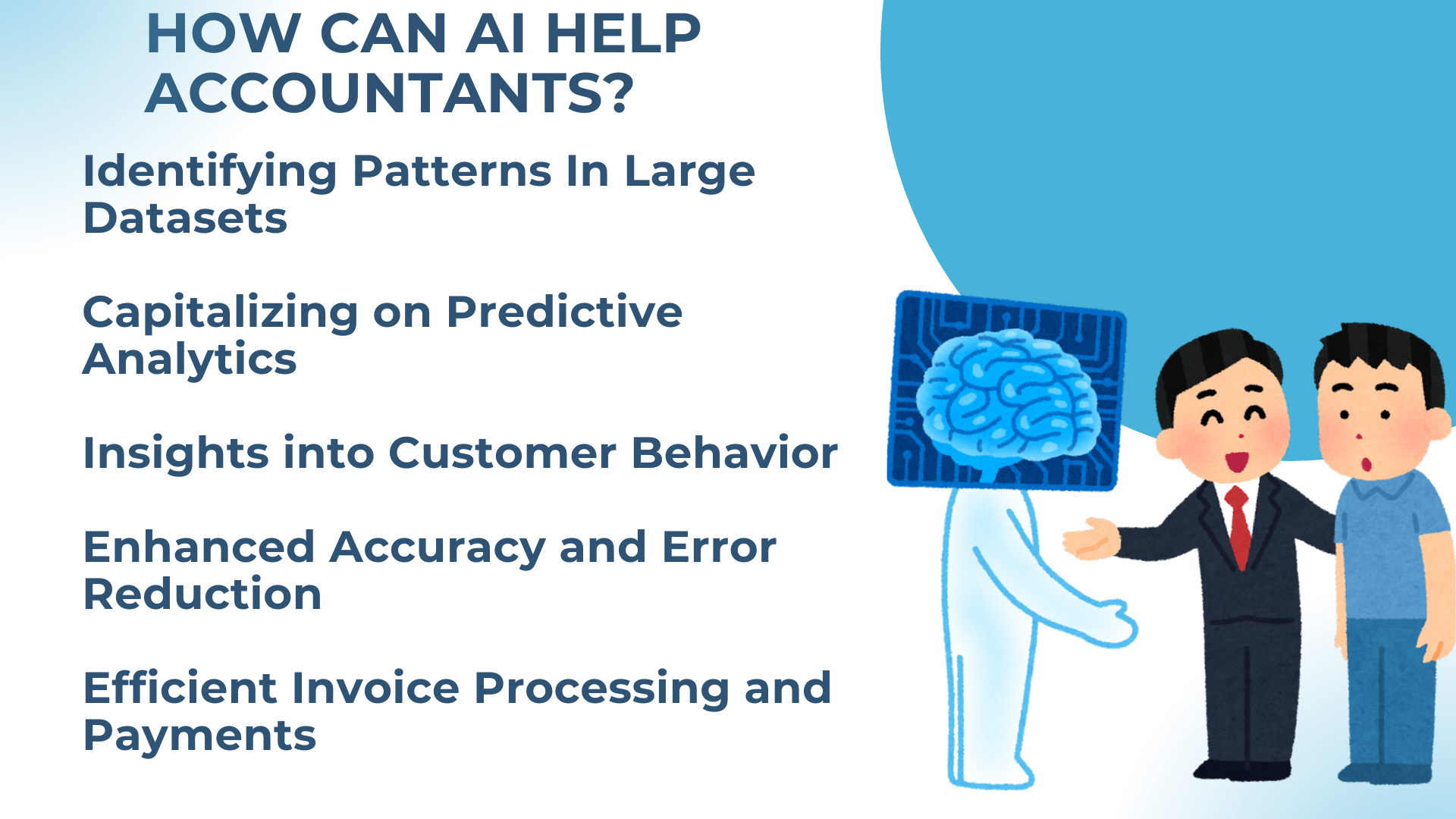How does AI in accounting work?
Imagine a world where the mundane tasks of number-crunching are a thing of the past.
Welcome to the future of accounting, powered by Artificial Intelligence!
As a game-changer across numerous sectors, AI is revolutionizing the accounting industry too.
Think about it – AI isn’t just about automation. It’s about transforming the way accountants work.
It’s about addressing ethical dilemmas with security.
Let’s learn about its uses, benefits, and potential issues.
Routine Task Automation
AI possesses a knack for automating routine tasks that often eat up precious time and resources.
Automated systems can manage tasks like data entry, processing invoices, and reconciliation.
This automation allows accountants to shift their focus to more important tasks.
It paves the way for them to offer more in-depth advice.
They can also help cultivate strong, personal bonds with clients, trust and loyalty.
It’s a win-win situation!
Enhanced Accuracy
Accuracy is king in financial reporting.
AI, on the other hand, is the knight in shining armor, safeguarding against human error.
Algorithms and machine learning, allow AI systems to sift through massive datasets.
They spot patterns and anomalies that might slip past human accountants.
But there’s more to it. AI doesn’t just spot errors; it helps prevent them.
The analytical prowess of AI allows accountants to produce financial statements with accuracy and make decisions driven by real-time data.
Moreover, AI’s predictive analytics capabilities can forecast future trends based on historical data, enabling proactive decision-making.
This means businesses can anticipate market changes and adjust their strategies accordingly.
So, AI isn’t just about correcting the past; it’s about shaping the future.
Efficiency
AI systems are equipped with speed and precision.
Hence, they can expedite tasks that would typically take humans a considerable amount of time.
For example, they can quickly generate invoices, analyze financial data, and create reports with remarkable accuracy.
AI’s efficiency allows accounting firms to enhance their workflows, conserve time and resources.
This efficiency frees up accountants’ time to concentrate on activities that require human expertise, like strategic planning, client consultation, and solving complex problems.
Moreover, this shift towards more strategic roles can lead to increased client satisfaction and business growth.
Holistic Insights
Cloud-based accounting platforms, supercharged with AI capabilities, are a treasure trove of client data for accountants.
The information enables accountants to delve deeper into their clients’ financial health, trends, and patterns.
With these insights at their fingertips, accountants can do more than just automate transactions.
They can provide strategic guidance, offer expert advice, and become trusted advisors.
AI-generated insights allow accountants can help clients make informed business decisions, steering them towards growth.
Furthermore, this data-driven approach can lead to more personalized client service.
AI in Accounting – Pros and Cons
Let us go through the biggest benefits of AI in accounting.
1. Enhancing Accuracy and Error Reduction
AI-powered accounting software is a powerhouse capable of analyzing vast amounts of data with a precision and speed no human can.
This both minimizes the chance of errors and guarantees the accuracy and reliability of financial statements.
But that’s not all.
AI algorithms are spotting inconsistencies, reconciling discrepancies, and pinpointing potential errors that might slip through the human eye.
So, it’s not just about doing things faster, but also about doing them better.
Moreover, this level of accuracy can enhance regulatory compliance and reduce the risk of financial penalties.
2. Automated Data Entry and Bookkeeping
AI automates data entry and bookkeeping.
This, consequently, reduces manual input time and effort.
In other words, it increases efficiency and reduces human error.
This not only improves productivity but also allows accountants to play a more strategic role in business decisions.
Additionally, this automation can lead to significant cost savings.
3. Streamlined Financial Analysis and Reporting
AI is a powerful tool that can revolutionize financial processes.
It can automate data analysis, generate insightful reports, and provide valuable insights at a speed and scale beyond human capabilities.
By swiftly processing and analyzing intricate financial data, AI can identify trends and extract significant information.
This not only streamlines financial analysis and reporting but also empowers accountants to make informed decisions backed by accurate and up-to-date information.
Adding to this, AI’s machine learning capabilities allow it to learn from the data it processes.
This means the more data it analyzes, the better it becomes at providing insights.
Furthermore, AI can also help in risk management by predicting potential financial risks based on historical data.
In essence, AI is not just streamlining financial processes; it’s transforming them.
4. Improved Fraud Detection and Prevention
AI has the potential to enhance fraud detection and prevention in accounting.
AI algorithms can analyze vast amounts of data from multiple sources and identify patterns that indicate fraudulent activities.
By detecting anomalies and suspicious transactions, AI systems can assist accountants in mitigating fraud risks and protecting the financial interests of businesses and clients.
5. Efficient Invoice Processing and Payments
AI is a game-changer when it comes to automating invoice processing and payments.
It significantly cuts down the manual labor involved.
AI-powered systems can effortlessly extract information from invoices, pair them with the relevant records, and kick-start payment processes.
This smoothens the accounts payable process and also boosts efficiency and curtails payment delays.
With AI, businesses can also track their expenses more accurately, ensuring better financial management.
Plus, the automation of payments can improve relationships with suppliers by ensuring timely payments.
However, AI isn’t perfect. Here are some of its biggest pitfalls.
1. Dependence on Technology
The power of AI in accounting undeniably depends on technology.
A hiccup or malfunction in the AI system could throw a wrench in the accounting process, potentially causing errors or delays.
It’s crucial for businesses to have a strong maintenance strategy.
This means they must keep their systems updated, and have backup plans ready to tackle any tech-related challenges.
But there’s more to it.
As AI systems learn and evolve, they need to be trained with high-quality, diverse data to ensure accurate and unbiased results.
Also, given the sensitive nature of financial data, businesses must prioritize data security and privacy when implementing AI solutions.
This includes using secure data storage, encryption, and access controls.
In essence, the success of AI in accounting hinges not just on the technology itself, but also on how it’s managed, updated, and secured.
It’s not just about having AI; it’s about using it effectively and responsibly.
2. High Initial Implementation Costs
Integrating AI into the accounting realm can be an exciting yet challenging endeavor.
It’s similar to planting a seed that requires nurturing through substantial initial investments.
This financial commitment is not limited to procuring state-of-the-art AI software.
Namely, it also extends to setting up robust hardware infrastructure.
It has to be able to support the complex calculations AI demands.
Investing in comprehensive training programs is also a must, to equip the staff with the necessary skills to use this new technology effectively.
These upfront costs may seem daunting, particularly for smaller accounting firms.
Yet, it’s important to view them as stepping stones towards streamlined operations and improved accuracy.
3. Potential Job Displacement in Accounting
There is a concern that AI could replace some accounting jobs traditionally performed by humans.
Automation of routine tasks may lead to a reduced need for manual labor in certain areas of accounting.
However, it’s crucial to shift our perspective and not view AI as a replacement.
It is more of a powerful ally.
AI’s primary role is to augment, rather than eliminate, human capabilities.
It’s like having a sophisticated assistant that can handle repetitive tasks with speed and accuracy, freeing up accountants to channel their expertise.
4. Ethical Concerns and Data Privacy Risks
We could compare the integration of AI into the accounting sector to opening a Pandora’s box of sensitive financial data.
Myriad of ethical dilemmas and potential risks associated with data privacy arise.
As data has become the new gold, robust data security measures are more important than ever.
They are not just about safeguarding numbers, but protecting the trust and confidentiality that clients place in their accounting firms.
Compliance with relevant regulations isn’t simply a legal necessity. It is a commitment to ethical responsibility.
Moreover, the advent of AI in accounting requires clear policies and guidelines.
In essence, while we use the power of AI to revolutionize accounting, we must also uphold ethics, privacy, and security to ensure a balance between innovation and integrity.
5. Limited Understanding of AI among Professionals
AI can seem like a mystery.
Especially so for accounting professionals who are more accustomed to balance sheets than binary code.
Most professionals don’t have the profound understanding of AI and its transformative potential yet.
This knowledge gap is a steep learning curve.
Thus – professionals need to arm themselves with the necessary skills and knowledge to wield the power of AI effectively.
This isn’t just about staying relevant in a rapidly evolving industry, but about maximizing the benefits that AI brings to the table.
So, while the journey may be challenging, the destination promises a future where accountants can leverage AI to drive productivity to new heights.
To Wrap Things up
While the merits of AI in accounting are evident, we must recognize the potential hurdles that could arise during its adoption.
To tackle these challenges, proactive steps are needed.
Rigorous system maintenance, continuous training initiatives, and comprehensive ethical guidelines are the basis for getting the most out of AI in accounting.
We should be excited for the future, but there is a long way ahead of us.
Jelena Lukic
Jelena has a Master’s Degree in teaching Serbian literature and language. Creative writing is her biggest passion.









